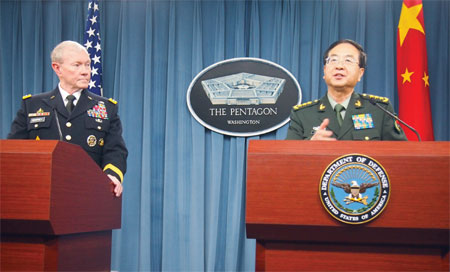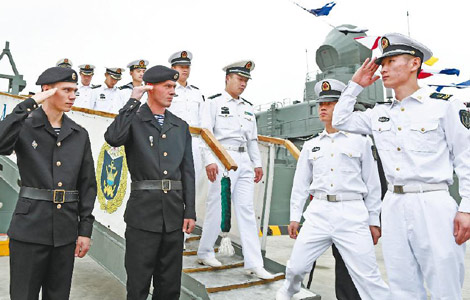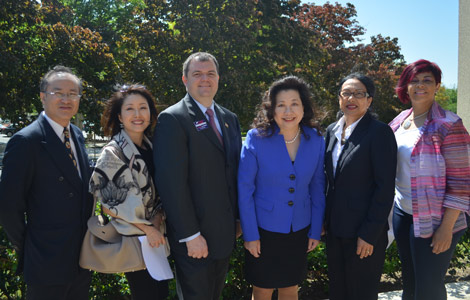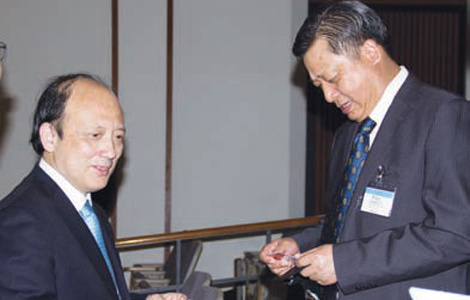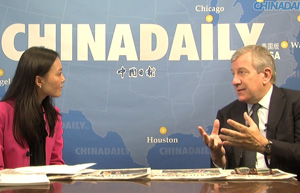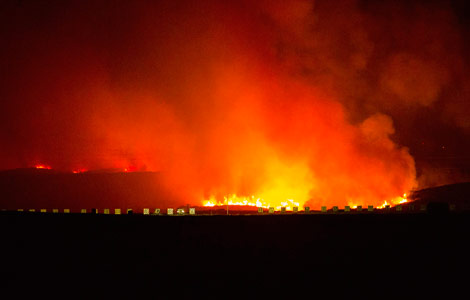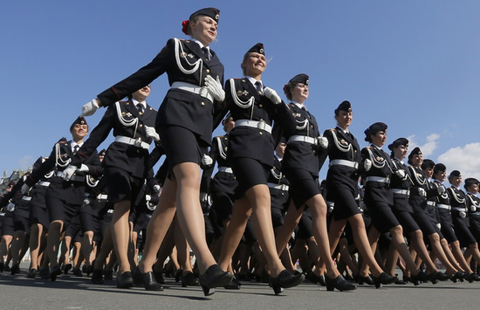China, US boost military hotline
Updated: 2014-05-16 11:43
By Chen Weihua in Washington (China Daily USA)
|
||||||||
|
General Fang Fenghui, chief of the General Staff of China's People's Liberation Army, speaks at a joint press conference at the Pentagon on Thursday afternoon after holding a two-hour meeting with General Martin Dempsey (left), chairman of the Joint Chiefs of Staff. Chen Weihua / China Daily |
The Chinese and US militaries agreed on Thursday to take further measures to boost cooperation and manage differences.
General Fang Fenghui, chief of the General Staff of China's People's Liberation Army, said the two sides agreed to carry on substantive consultation at the earliest date possible on establishing a mechanism for notification of major military actions, as well as the standards of behavior on the high seas.
The two sides also agreed to upgrade the hotline between the chief of PLA General Staff and US chairman of the Joint Chiefs of Staff into a secure video conferencing system, Fang told the joint press conference at the Pentagon on Thursday afternoon, after holding more than two hours meeting with General Martin Dempsey.
Dempsey said he hoped the secure video conferencing would be in place by the fall of this year.
Fang is paying a five-day visit to the US at the invitation of Dempsey, who visited China in April of last year at the invitation of Fang.
Before the two started their meeting on Thursday morning, Fang and his delegation received full military honors in a welcoming ceremony on the big lawn outside the Pentagon building facing the Potomac River and the Washington Monument.
An honor guard of about 250 from the US Army, Navy, Air Force, Marines and Coast Guard took part in the ceremony, which included a 19-gun salute and the Navy band performing the national anthems of China and the US. Some Pentagon officials said they hadn't seen such a grand welcoming ceremony for quite a while.
Other progress made after the meeting on Thursday included that both sides will promote more joint exercises in search and rescue, humanitarian aid and disaster relief and the establishment of a dialogue mechanism between the strategic planning departments of the two militaries. The two sides also want to explore joint drills in a third country.
Fang said the topics covered during the talks included counterterrorism, anti-piracy on the high seas, the Diaoyu Islands in the East China Sea and issues in South China Sea.
"Under the guidance of leaders of the two nations, the military-to-military relationship between the two countries has been developing well," Fang said.
"We should cherish these hard-won achievements, prevent possible disruptions and continue to move forward."
Dempsey said he and Fang continued their conversation on the military-to-military relationship, focused on further understanding one another and deepening cooperation between the two armed forces while managing their differences.
"Today's meeting was productive. We made progress on important issues," Dempsey said. "We commended each other on the progress we made in establishing confidence building agreed to by our presidents at last year's Sunnylands summit."
Dempsey described the initiatives reached on Thursday as "intended to continue to build a positive relationship, help us manage risks and reduce the chance of misunderstanding."
In their meeting on Thursday afternoon at the White House, US Vice-President Joe Biden and Fang both affirmed the importance of and the need to maintain momentum in the development of US-China military-to-military relations, according to a White House press release.
Dempsey said the Rim of the Pacific naval exercise, in which China will be taking part for the first time, fosters sustained and cooperative relationships. The exercise, known as RIMPAC, is set for June 26 and August 1 off Hawaii, involving 23 nations.
"The global maritime environment is simply too large and too complex for any one nation," Dempsey said.
Fang said he hoped the US would adopt an objective attitude on issues in the East and South China Seas so as not to allow them to disrupt the healthy and stable development of relations between the two countries and two militaries.
He believes that some countries in the region have tried to cause trouble by taking advantage of the US rebalance to Asia strategy and China's need for stable economic development.
Fang told the media that China has exercised great restraint in the South China Sea over the years when other countries have set up oil rigs there. And China's oil rig is within China's territorial waters, referring to the recent construction of an oil rig only 31 km away from the Zhongjian Island, part of China's Xisha Islands.
He also explained the Chinese principle of sheltering differences and seeking common exploitation.
He voiced China's determination to ensure the successful drilling at the oil rig.
Fang also explained to the foreign media that it was Japan's nationalization of the Diaoyu Islands in the East China Sea that changed the status quo for 40 years.
Fang believes issues that cause concerns in the Asia Pacific include the denuclearization on the Korean Peninsula, Japan's territorial disputes with China, South Korea and Russia and some disputes in the South China Sea.
On Thursday afternoon, Fang departed for North Carolina to visit the US Army Forces Command at Ft Bragg. He will wind up his trip with meetings in New York on Friday.
On Tuesday, Fang visited the US Third Fleet in San Diego, California, and met Admiral Samuel Locklear, commander of US Pacific Command, who escorted Fang on a tour of the aircraft carrier USS Ronald Reagan.
chenweihua@chinadailyusa.com
- China hosts major Asia security conference
- Xi vows support for Afghanistan reconstruction
- Security summit to help build mutual trust
- Russian president arrives for state visit
- China suspends cyber working group activities with US to protest cyber theft indictment
- China publishes latest data of US cyber attack
Most Viewed
Editor's Picks

|

|

|

|

|
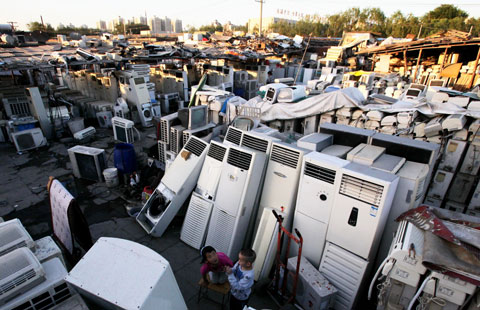
|
Today's Top News
China slams indictments over cyber snooping
China's real estate market: collapse or managed slowdown?
Envoy seeks Chinese backers for key infrastructure projects
Andre Agassi will open 39 more charter schools
New JV forms world's largest auto interiors supplier yet
Improve Sino-US military ties
US envoy seeks Chinese backers for key projects
China summons US ambassador over indictment
US Weekly

|

|
